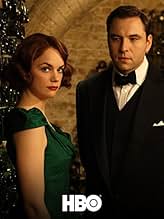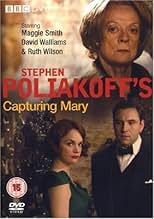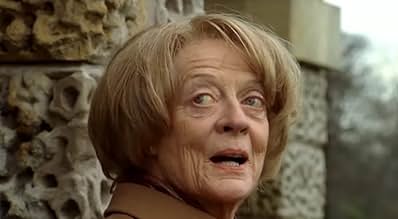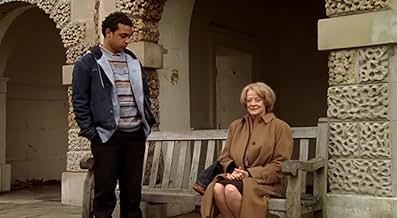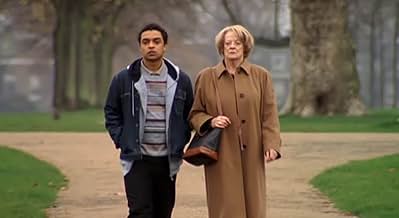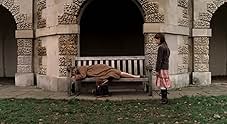IMDb RATING
6.7/10
2.2K
YOUR RATING
A young man ushers an older woman into a dark exploration of her past - back to the time when, as a young girl, she met a stranger who affected her life forever.A young man ushers an older woman into a dark exploration of her past - back to the time when, as a young girl, she met a stranger who affected her life forever.A young man ushers an older woman into a dark exploration of her past - back to the time when, as a young girl, she met a stranger who affected her life forever.
- Nominated for 1 Primetime Emmy
- 1 win & 6 nominations total
Freya Berry
- Beautiful Girl
- (uncredited)
Jessica Blake
- Party guest
- (uncredited)
Lily Brown Griffiths
- Party guest
- (uncredited)
Kate Burdette
- Charlotte
- (uncredited)
Lexie Lambert
- Parlour Maid
- (uncredited)
Silvia Lombardo
- 1960s Party Guest
- (uncredited)
Luke Lynch
- Man Leaving Pub
- (uncredited)
- Director
- Writer
- All cast & crew
- Production, box office & more at IMDbPro
Featured reviews
It is what it is. If you watched Joe's Palace, you'll get it. For those who called it rubbish, you're absolutely wrong. WWII was a beastly time in history, deep in conjecture. This is a good objective look on the frivolity and incomprehensible behavior and in-observance of that time in history. No different from now, same atrocities, same indifference and justifications of those in power. Inflictions of most civilians were not intended or personal, people were just trying to get through it, confused and thriving on distractions. So watch it, it's a history lesson. 10 for performances. You need to view Joe's Palace first. Great films for WWII history buffs, and promises an entertaining and pensive evening for both genders. It's a different take on the brutality of that time. Not drenched in warfare and genocide, but still moving and painful.
The performances by Maggie Smith and David Walliams was excellent, as expected. The filming was beautiful as well. However, I have absolutely no idea what this movie was about. There was no point that was made.
I feel like I wasted 100 minutes of my life. What a fail!
I feel like I wasted 100 minutes of my life. What a fail!
Hard not to argue with all the 1 and 2 star ratings. This is not a Hollywood-type movie. My take is a little different from those who believe the film is about power over others or miss spent youth. In trying to understand why this movie was made, and why many seem to think that there is not plot - I suggest the following.
Greville never existed. He symbolically, was Mary's past, which she never fully escaped from.
Greville was the representation of those times. He understood the horrors of the class system and power, but insisted that elitism is the better choice over the unwashed masses. That much is clear, that is, his attitude. Why did Greville need Mary's help? Because Greville was dying, that is, his power waning, his generation losing influence. That is, he is clearly depicted as representing his times in his unchanging attitude and even his 'symbolic' refusal to dress to the times. He knew many secret things, but no one really knew who or what he did, again symbolic, not really a man, but an incarnation of the theme - the passing of a generation.
But how could have Mary helped this 'symbol'? She was a writer, and could have written/influenced the course of social change. She lost her job, as it was stated, because her 'voice of youth' had already become passe. Mary, again as stated, was born between what was coming of age and what was dying socially. Somewhere along the way she lost her voice, her inspiration. Greville, wanted her to be his partner, he could help her professionally, meaning that by writing favorably of the past, of those mores, beliefs, and class system, those still in power (albeit waning) could support her.
Greville, the symbol, didn't directly have Mary fired. It was a plot device. Mary, as was stated, simply lost favor as the times moved on. Mary was torn between the past and her uncertain future. She dressed the part, again as stated, but she really didn't belong to the changes coming.
I believe, if you see Greville as a plot device, a symbol of Mary being lost between generations, then we see the sad story of a women who was lost. She was at her best when she was young, criticizing the mores of class and status. But then that grew tiresome, and meaningless, being on the leading edge, that type of criticism was soon to be common place.
The Greville, inside of her, wanted her to support what was refined in society, even if the gild often covered over ugliness just beneath the surface. Greville haunted her, when she wrote, she always ended up in the wine cellar, a symbol of the elite.
Why couldn't she surrender to Greville, that is, the voice in her representing, belonging to the past? That is a hard question to answer, and I would think could only be answered subjectively. I can venture to say that she recognized the ugliness of the past, but also could not accept how social change was pushing society towards also becoming ugly, common. Consequently, she was lost between two worlds. One the one hand a world her youth rejected, and the other which she becomes common herself, and wrote about antiques.
Greville never existed. He symbolically, was Mary's past, which she never fully escaped from.
Greville was the representation of those times. He understood the horrors of the class system and power, but insisted that elitism is the better choice over the unwashed masses. That much is clear, that is, his attitude. Why did Greville need Mary's help? Because Greville was dying, that is, his power waning, his generation losing influence. That is, he is clearly depicted as representing his times in his unchanging attitude and even his 'symbolic' refusal to dress to the times. He knew many secret things, but no one really knew who or what he did, again symbolic, not really a man, but an incarnation of the theme - the passing of a generation.
But how could have Mary helped this 'symbol'? She was a writer, and could have written/influenced the course of social change. She lost her job, as it was stated, because her 'voice of youth' had already become passe. Mary, again as stated, was born between what was coming of age and what was dying socially. Somewhere along the way she lost her voice, her inspiration. Greville, wanted her to be his partner, he could help her professionally, meaning that by writing favorably of the past, of those mores, beliefs, and class system, those still in power (albeit waning) could support her.
Greville, the symbol, didn't directly have Mary fired. It was a plot device. Mary, as was stated, simply lost favor as the times moved on. Mary was torn between the past and her uncertain future. She dressed the part, again as stated, but she really didn't belong to the changes coming.
I believe, if you see Greville as a plot device, a symbol of Mary being lost between generations, then we see the sad story of a women who was lost. She was at her best when she was young, criticizing the mores of class and status. But then that grew tiresome, and meaningless, being on the leading edge, that type of criticism was soon to be common place.
The Greville, inside of her, wanted her to support what was refined in society, even if the gild often covered over ugliness just beneath the surface. Greville haunted her, when she wrote, she always ended up in the wine cellar, a symbol of the elite.
Why couldn't she surrender to Greville, that is, the voice in her representing, belonging to the past? That is a hard question to answer, and I would think could only be answered subjectively. I can venture to say that she recognized the ugliness of the past, but also could not accept how social change was pushing society towards also becoming ugly, common. Consequently, she was lost between two worlds. One the one hand a world her youth rejected, and the other which she becomes common herself, and wrote about antiques.
Please....Please......Please....Someone please help me recapture the wasted time and brain space this terrible movie stole from me.....I have been on IMDb website thousands of times and have never left a review.....this was so bad that I was motivated to sign up solely for the purpose of warning people....if I can save one person from the torture of this atrocity, I will be quite content....Take your remote control.....Close your eyes.....push any buttons.....and you will do better than choosing this train wreck......I think I need a couple hours of South Park to get the taste of this movie out of my mouth.............Peace
Maggie Smith was the drawcard for watching this oddity that sounded like it may have had something to say. Writer/director Stephen Poliakoff keeps the viewer waiting to see if his story will develop into a profound revelation or simply avoid the issues being seriously suggested. This treatment is nothing more than a filmed stage play & these usually leave the patient viewer wondering why they bothered to stay through to the end - 'Mary', proves to be just another . In the 60's and 70's a movie like this might have been produced by the B.F.I. as a 30-40min short story and would have been interesting all the way but, being stretched for over 100mins kills sustained interest & is quite infuriating. Poliakoff's grandfather had associations with the company that supplied hearing aids to famous people i.e. Winston Churchill - so it's possible some stories of a 'personal' nature may have been overheard or known.
There are stories involving political and royal dignitary's, movie makers, and socialites, ugly enough to nauseate and make the skin crawl - this story dramatically hints of many such people being implemented in such evil occurrences, but then rattles on, going nowhere. It appears 'Mary' is the second part of an earlier movie titled 'Joe's Palace' - If this overlong HBO/BBC spin-off is any indication - then might just be best to stay away from both. Disappointing.
There are stories involving political and royal dignitary's, movie makers, and socialites, ugly enough to nauseate and make the skin crawl - this story dramatically hints of many such people being implemented in such evil occurrences, but then rattles on, going nowhere. It appears 'Mary' is the second part of an earlier movie titled 'Joe's Palace' - If this overlong HBO/BBC spin-off is any indication - then might just be best to stay away from both. Disappointing.
Did you know
- TriviaCompanion piece to Joe's Palace (2007), which is the first movie.
- ConnectionsFeatured in The 62nd Primetime Emmy Awards (2010)
Details
- Release date
- Countries of origin
- Language
- Also known as
- Поимка Мэри
- Filming locations
- 38 Hill Street, Mayfair, London, England, UK(Mayfair mansion exteriors)
- Production companies
- See more company credits at IMDbPro
Contribute to this page
Suggest an edit or add missing content


